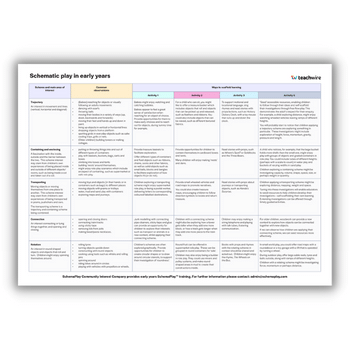One-page PDF
Early Years, KS1
Years R-1
Learn how to identify common schemas of play and scaffold children’s learning through activities and play opportunities.
This schematic play resource covers the main areas of interest involved in each scheme, common observations and 20 activity ideas to scaffold learning.
Schemas of play
The schemas of play covered in this download include:
- Trajectory – an interest in movement and lines (vertical, horizontal and diagonal)
- Containing and enclosing – a fascination with the inside, outside and the barrier between the two. This scheme interest may stem from children’s own experiences of being placed inside and outside of different objects/rooms, such as being inside a cot and taken out of a cot
- Transporting – moving objects or moving themselves from one place to another. This scheme interest may stem from children’s own experiences of being transported in prams, pushchairs and cars. The transporting scheme is a trajectory and containing scheme being combined.
- Connection – an interest in connecting or tying things together, and opening and closing.
- Rotation – an interest in round-shaped objects and objects that roll and turn. Children might enjoy spinning themselves around.
Schemes are ‘patterns of repeatable actions/behaviours’ (Athey, 2007:114). The early scheme operations in young children’s play are the foundations for later complex operations, such as reading, writing and adding, and everyday operations such as driving and cooking (Siraj-Blatchford and Brock, 2016).
Operational schemes also enable us to make sense of the objects, images and words around us; the figurative schemas.
Lynnette Brock is director of SchemaPlay, which provides early years SchemaPlay™ training. Read more about schematic play in early years.














